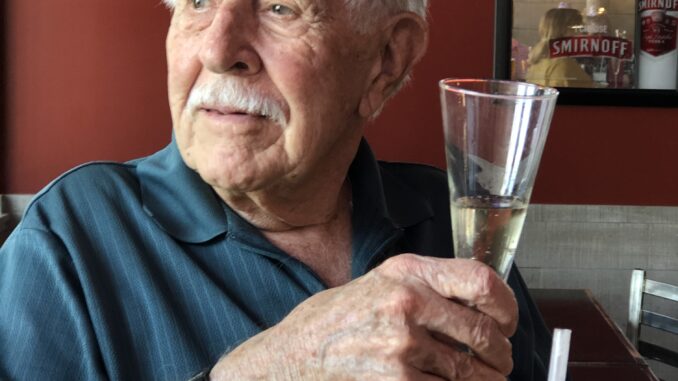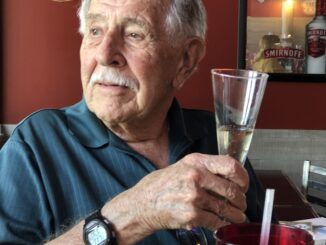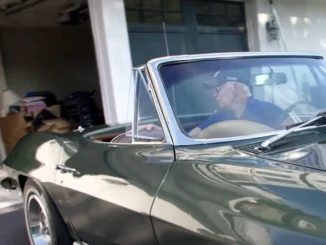
Dealing With the Inevitable
Whether or not you’ve already served your allotted time on this planet, you’ve had to deal with death at some time along the way. It’s part of the life cycle, it happens to us all, no one is ever spared, and it’s all about how you face it. Right. And how many obituaries have you read lately? Isn’t it far different to deal with it in the abstract until it happens that it is your own loved one who actually passes?
My best friend has just suffered the loss of his second child in the past few months, his last remaining offspring. He had been a tower of strength and tenacity since the death of his wife several years ago. After all, he still had his two beautiful daughters, who loved him dearly and whom he likewise adored. How much grief is a person supposed to tolerate, anyway? Is the Lord acting democratically when he takes the last remaining connection one has to a lifetime of love? What can you say to a devastated man to make him feel that he’ll ultimately be able to live a normal life again? You know that he’ll spend his life trying to get over it, and the best he can hope for is to walk around with a gaping hole where his heart used to be. I only know this because I’ve lost my only son and two daughters over the years, so maybe I’m an appropriate one to comfort him. And I will do my best, so help me.
But what about the death that lingers for years, that tears at your gut every time you see your darling lose a little more of her precious cognitive abilities? It hasn’t been called “the longest goodbye” without good reason. It’s death whose presence is always hovering nearby. It can’t be cured with anything available to modern science, and the only remedies that can be offered are those that merely address symptoms. Better than nothing, they tell you, but they’re little more than ways to “make her comfortable” in her final days. I’m talking about Alzheimers, of course, and I think I can speak for a million caregivers who are similarly grieving in advance. Every day is a funeral to us, every moment of lucidity a victory and a pinpoint of hope. But over the months you can actually chart the decline. And because she now lives among several dozen fellow sufferers, you can see with some clarity that you’re viewing your own wife in each expressionless face. And you go home and grieve afresh. And you start thinking the unthinkable, that wouldn’t she be better off if the Lord took her right now and saved her these last months – or years – of agony. And it makes you feel worse than ever, because now you’re thinking of hastening the end of the one life in this world than has been most precious to you for all these years. And you hate yourself for even daring to think that you may again be ready to share your remaining life with someone else who may come along later.
So what can I tell my friend about how to deal with his losses? I could tell him that each of us grieves in different ways, and that in time the anguish may just become an unwelcome part of your day. I had another friend who kept a shrine to his wife at home, with pictures, candles and memorabilia, and in his car he placed another picture, which he talked to when he drove anywhere. Maybe that was an extreme way of grieving, but it was his way and he was certainly entitled to express his ongoing love in this manner. I know other people who have become reclusive, withdrawn from all contact with friends and family. It is not unusual for one to grieve himself to death this way. And there are still others who become hyperkinetic with their new status, and who tend to be victimized by the hasty relationships they develop.
For my part, I’m working to maintain some kind of balance between spending time with my friends and family, my church, my writing, and of course, my daily visits to my wife. Thank God for friends! They’re always there to listen and offer assistance, should I ask for it, and they even check in on me when I miss a few days at the pub. Family members are sympathetic, but I find that some of them really don’t want to be involved at any meaningful level. They have busy lives and families of their own to nurture The church has been a godsend (no pun!) and the congregation seems to be as caring as any group I’ve ever been associated with. Writing is a way for me to focus my scattered thoughts and try to make sense of the world that sometimes seems callous and indifferent. And although I know the “long game,” I’ll be there at my wife’s side as long as we both draw breath. If it’s possible to love someone more now than ever, I’m a living example. In her I see strength and a fighting spirit that make me wish I could be half as strong as she.
But my case doesn’t apply to anyone but me. When a loved one is lost without warning, or with little time to prepare, that can bring a whole new set of circumstances. Where I’ve had years to prepare for the inevitable, one who has suffered a sudden loss has been stripped of his emotional armor without warning. Should he go off somewhere and mourn privately? Yes, if that works for him. Should he seek the support of friends and family? By all means, in part because the loved ones really can be partners in grief, and they also need consolation and resolution. It can bring us closer than ever to those we love. It’s never too late for a little bonding.
I’ve had friends who literally gave up on life after the loss of their life’s partner, and willed themselves to die. We’ve all read of those intensely bonded people who die days apart, because they were a single life during their time together. If that is what a surviving partner desires, who am I to argue with them? I can always point out the myriad reasons we have to keep living, but when grief is one’s only remaining emotion, their wish to be reunited is to be respected, even if it can’t be endorsed.
As I walk with my grieving friend down this path toward some kind of renewed existence, the most I can do is listen carefully. I don’t want to be telling him that it’s time to get over it, to snap out of it, to quit already with the self-pity. When I listen, I want to be sensitive to his thoughts, but not opinionated in my responses. I want to offer him the level of caring that tells him that nobody can walk in his shoes or on an identical path, but we can do our best to interpolate between his journey and mine.
When we think we’re alone in this journey, it’s always comforting to know that each one of us has an unique story to share. So if anyone reading this has thoughts to offer on the subject, please feel most welcome to chip in.
George Thatcher August 2002
George is an American Bad Ass. He grew up in Jersey, flew B-52s in Vietnam, taught English, Spanish and other languages to children around the world, makes his own salsa, has been known to enjoy a beer or two and has called Lubbock home for a few years, just to entertain the locals. Welcome to Raiderland, Major. We are going to feature some of his writings going forward. Some new, some old. Some rhyme, some don’t. When it comes to George, there’s no box. So… enjoy our friend and enjoy his writings! – Hyatt




You must have the biggest heart ever.
George – you ARE the best friend, doing the best two things possible for your friend: 1) Being there and 2) Allowing them to grieve in their own way.
Well done and well written/spoken.